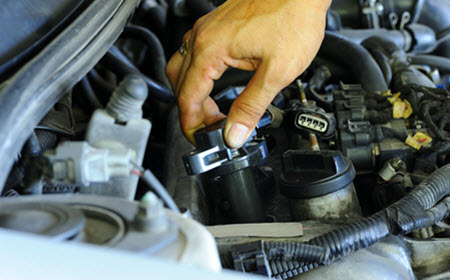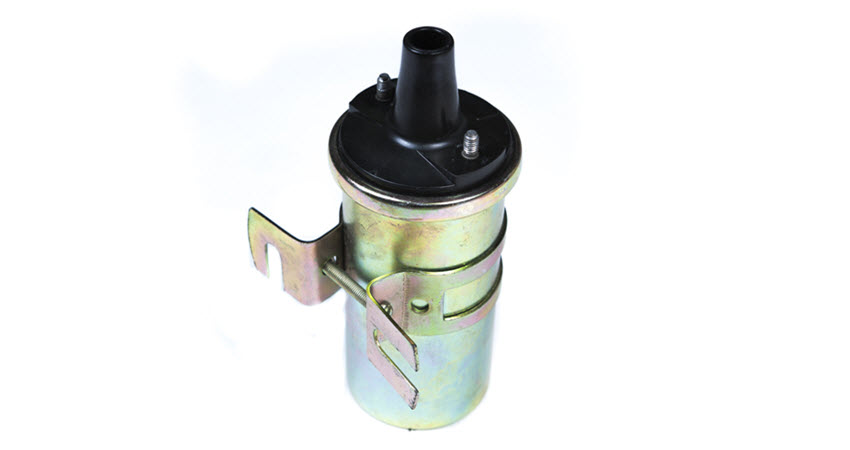An ignition coil is an essential component of your Volkswagen’s ignition system. Its primary function is to act as an electrical transformer, converting the relatively low voltage provided by your car’s battery into the high-voltage electrical discharge necessary to create the spark that initiates combustion in the engine’s cylinders. This spark is the driving force behind your car’s ability to move and perform optimally. Essentially, ignition coils are the ignition system’s powerhouses, ensuring your engine runs efficiently.
What Will Go Wrong with an Ignition Coil Failure
Understanding the potential risks associated with ignition coil failure is paramount in maintaining your Volkswagen’s performance. Here are some of the risks you may encounter when your ignition coil malfunctions:
- Engine Misfires: One of the most noticeable symptoms of a failing ignition coil is engine misfires. When the coil fails to generate the necessary spark for one or more cylinders, it can lead to misfires. These misfires result in a host of issues, including reduced power, decreased fuel efficiency, and a generally rough-running engine.
- Decreased Fuel Economy: A malfunctioning ignition coil can disrupt the combustion process within your engine, leading to inefficient fuel burning. This inefficiency directly translates into decreased fuel economy, meaning you’ll find yourself filling up your gas tank more frequently and spending more money at the pump.
- Increased Emissions: Incomplete combustion due to ignition coil failure can contribute to higher emissions from your car. This not only has a negative impact on the environment but can also result in your car failing emissions tests, leading to additional expenses and potential legal repercussions.
How to Identify Ignition Coil Failure
Now that we’ve discussed the importance of ignition coils and the risks and benefits associated with their failure, let’s delve into the process of identifying when your Volkswagen’s ignition coil may be malfunctioning. Here are some common signs and symptoms to watch out for:
- Check Engine Light: If your car’s check engine light illuminates on the dashboard, it could be a signal of ignition coil problems. Modern cars are equipped with onboard diagnostic systems that can detect irregularities in the ignition system and trigger the check engine light.
- Engine Misfires: As mentioned earlier, engine misfires are a primary indicator of ignition coil failure. You may experience a noticeable shudder or hesitation during acceleration, especially under load.
- Rough Idle: A malfunctioning ignition coil can result in a rough or uneven idle. Your engine may feel less stable, with irregular RPM fluctuations when your car is stationary.
- Reduced Power and Performance: A decline in power and overall performance is often associated with ignition coil issues. You may notice slower acceleration, decreased throttle response, and a general lack of energy in your car.
- Poor Fuel Efficiency: Ignition coil problems can lead to inefficient combustion, causing your car’s fuel efficiency to suffer. If you find yourself making more frequent trips to the gas station, it could be a sign of ignition coil trouble.
How to Fix Ignition Coil Failure
If you’ve identified the signs of ignition coil failure in your Volkswagen, the next step is addressing the issue. Here’s a step-by-step guide on how to fix ignition coil problems:
- Diagnostic Scan: Begin by performing a diagnostic scan of your car using an OBD-II scanner. This will help pinpoint the specific cylinder or cylinders affected by the faulty ignition coil.
- Locate the Faulty Coil: Using the diagnostic scan results, locate the ignition coil that is causing the issue. Most modern Volkswagen models have individual ignition coils for each cylinder.
- Safety Precautions: Before proceeding with any repairs, ensure that your car’s engine is cool, and disconnect the battery to prevent electrical accidents.
- Remove and Replace: Carefully remove the faulty ignition coil. Depending on your car’s make and model, this may involve removing the engine cover and disconnecting electrical connectors. Replace the defective coil with a new, high-quality ignition coil.
- Reassembly: Reconnect all electrical connectors and reinstall the engine cover if necessary. Double-check that everything is securely in place.
- Clear Error Codes: Use your OBD-II scanner to clear any error codes stored in your car’s computer. This will reset the check engine light and allow you to monitor the engine’s performance.
- Test Drive: Take your Volkswagen for a test drive to ensure that the issue has been resolved. Pay attention to engine performance, acceleration, and idle quality.
- Regular Maintenance: To prevent future ignition coil issues, adhere to your car manufacturer’s recommended maintenance schedule. This may include periodic replacement of ignition coils and spark plugs.
Contact Us For Volkswagen Ignition Coil Failure
Identifying and addressing ignition coil failure  in your Volkswagen is essential for maintaining optimal performance, fuel efficiency, and environmental responsibility. If you encounter any of the symptoms mentioned in this guide, don’t hesitate to take action.
in your Volkswagen is essential for maintaining optimal performance, fuel efficiency, and environmental responsibility. If you encounter any of the symptoms mentioned in this guide, don’t hesitate to take action.
For professional assistance in diagnosing and resolving ignition coil issues, contact Hayes European. Our experienced team serves the Santa Cruz, Aptos, Soquel, and Capitola, CA areas, providing expert automotive services to keep your Volkswagen running smoothly. Don’t let ignition coil problems disrupt your driving experience – reach out to us today for reliable solutions.
 Mon-Fri: 8:00AM-5:30PM
Mon-Fri: 8:00AM-5:30PM 1125 17th Ave Santa Cruz, CA 95062
1125 17th Ave Santa Cruz, CA 95062
